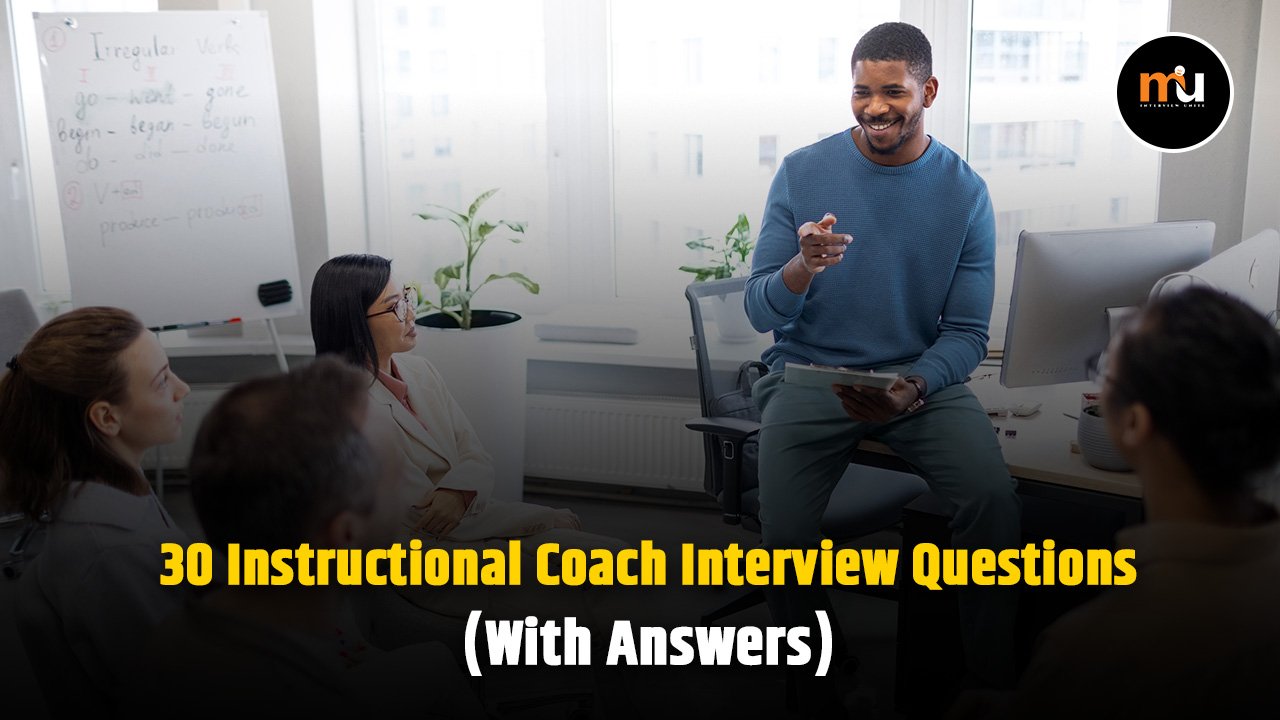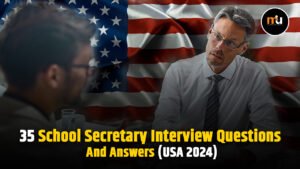Instructional Coaches help teachers build their capacities and facilitate data-driven professional development that maximizes student potential.
Making responses that show your knowledge of teaching as well as your teacher support skills and leadership abilities, as well as dedication to achieving equitable outcomes will demonstrate your ability to fulfill this multi-faceted, well-rounded role.
This summary of the most important interview questions as well as model answers focuses on areas that should be targeted.
30 Instructional Coach Interview Questions And Answers
1. Why Do You Want To Be An Instructional Coach?
Example Answer: I would like to help teachers grow and enable students to reach their potential to the fullest. My experience working with my staff to develop new methods of teaching taught me about the positive impact that coaching can bring. I’m passionate about helping educators develop their in their skills.
2. What Qualities Make An Effective Instructional Coach?
Example Answer: Good listeners who establish trust by providing support without judgment. They are excellent communicators, collaborators, and facilitators. They can personalize learning while directing teachers towards best practices making use of data efficiently.
3. How Would You Help Struggling Teachers Improve Their Instruction?
Example Answer: The first step is to examine assessment data in order to pinpoint areas of growth and observe the classroom in a non-invasive way to understand the challenges they face prior to establishing a customized coaching program.
Through asking questions that reflect or co-planning the accommodations I’d help teachers improve their skills through manageable steps.
4. How Do You Stay Current On Educational Research And Best Practices?
Example Answer: I actively read teaching journals, blogs, newsletters from educational non-profits/associations, and EdWeek.
I also join social media forums to regularly discuss effective interventions and methods based on evidence that produce equitable results.
5. How Have You Supported Social-Emotional Learning In Past Roles?
Example Answer: As a former school counselor I led teachers’ training in trauma-informed teaching that influenced referral rates for disciplinary issues significantly.
I’ve also designed community building circles in morning meetings that focus on building SEL competencies and also provided resources for top practices such as mindfulness.
6. What Data Would You Use To Identify Needs As An Instructional Coach?
Example Answer: Mostly formative evaluation and intertesting analytics that help identify the gaps in skills and differentiate requirements.
The leading and lagging metrics for attendance, engagement, and grades are equally important. It is important to collect qualitative data through periodic pulse checks for teachers and support tickets that contain growth targets, challenges.
7. Tell Me About A Time You Successfully Led Professional Development. What Worked Well?
Example Answer: Before rolling out PBL districts-wide I worked with teams prior to defining objectives, samples of projects, and reflection points for discussion.
The ability to collaborate during the session itself rather than lecturing greatly increased engagement while making sure that the outputs are directly aligned to teacher needs and inefficiencies.
8. How Would You Coach A Very Experienced Teacher Resistant To Trying New Classroom Approaches?
Example Answer: through active empathetic listening, you can find the common interest in the best for students.
Begin by encouraging small adjustments in a partnership that is supportive and focused on the why prior to the what. Perhaps teaching them together or filming the lessons to highlight strengths prior to formal observation. Building trust starts with trust.
9. How Have You Supported Teachers Implementing Technology-Based Instruction Effectively?
Example Answer: I offer customized group or one-on-one training that focuses on purposeful blended learning stations design, technology tool curation to differentiate and data-driven use techniques.
I’ve mastered scaffolded coaching using multimedia models as well as post-implementation debriefs that include troubleshooting help improve the adoption.
10. How Do You Ensure All Voices Are Represented In Curriculum And Instruction Decisions?
Example Answer: Having diversity in the family and staff when evaluating initiatives or materials is essential, particularly from marginalized groups that we need to be conscious of including.
Anonymous polls and equity walking protocols uncover blind spots. I also examine scaffolded lessons support through multiple lenses of culture prior to leadership meetings that focus on key decision-making.
11. What Methods Have You Found Most Effective When Observing Classrooms?
Example Answer: Begin quietly in the area that is least disruptive in order to get the student to understand the flow of learning. Narratives written in scripts detailing teacher instructions and types of questions and feedback, differentiation and more.
Connecting the evidence to the parameters of rubrics of instruction. Reflecting on the mirrors through reflections and self-assessment guided questions first.
12. How Have You Developed Productive Coach/Teacher Relationships In The Past?
Example Answer: Regular check-ins that focus on their needs first ensures that they are secure in goal-setting. By encouraging, requesting permission to make suggestions following established trust.
Consistently following up with no judgement with only resourcefulness and patience. Recognizing their commitment while accelerating the process of growing toward independence.
13. How Have You Supported New Teachers Through Mentoring Programs?
Example Answer: Co-planning accommodating lesson units supported by scaffolds that they later modify. Be observant and provide constructive, specific feedback in order to help build confidence.
Connecting them to experienced teachers mentors to establish assistance in between formal sessions. Eliminating feelings of overwhelm is essential in the beginning.
14. How Will You Help Teachers Have Difficult Conversations About Bias And Discrimination?
Example Answer: Through compassion and honesty, focusing on the process, not perfection, and reflecting without shame. Defining norms for restorative discussion such as agreements, circles and agreements allows the vulnerability.
The practice of resolving dangerous incidents helps to build up a sense of. Information on how to recognize even unconscious bias can help teachers monitor their own behavior while developing inclusive identities.
15. What Role Should Student Voice Have In Instructional Decisions?
Example Answer: Students provide an important perspective that could uncover the barriers to engagement we often overlook as educators.
Weekly focus group meetings, speedy polls, and exit tickets can guide needs assessment and planning activities. Modern approaches such as Youth Participatory Action Research truly help students to improve their learning experiences.
16. How Have You Collected And Used Student Data Effectively In Past Roles?
Example Answer: this question is to compile assessments benchmarking graphs as well as interim test heat maps to determine gaps in intervention across the RtI levels. Guiding PLC data dives to differentiate reteaching.
Making student portfolios of work/self reflections on mastery-based progress. Reviewing learning styles and SEL abilities to support integration.
Related More: 30 Solution Architect Interview Questions (With Answers)
17. How Have You Handled Receiving Difficult Feedback From Teachers Regarding Coaching Improvements In The Past?
Example Answer: with an unrestricted, neutral mentality that is focused on opportunities for growth rather than personal attacks. Inquiring about the details of the specifics of what was ineffective.
After that, I expressed my gratitude for their feedback and working together to adjust strategies to serve their requirements within my capabilities in the future.
18. How Would You Work To Earn Teacher Buy-In As An Instructional Coach?
Example Answer: The most straightforward answer is to start by the process of building trust, by first listening to concerns and goals prior to establishing any plans.
And then clearly describing what my role will be to aid in the pursuit of solutions for their students. Early wins that are quick and low-risk collaboration, high-reward and promoting autonomy helps build trust.
19. Tell Me About A Time You Adapted Instruction To Support Diversity And Inclusion. What Impacted The Outcome?
Example Answer: Recently,, I designed a module that can be customized to dissect the most commonly read texts through a variety of different cultural perspectives. Teachers choose activities that are aligned with the identities of their students to facilitate discussion by incorporating different perspectives.
Exit ticked demonstrated increased comprehension and a sense of belonging. This is attributed directly to their voices mirroring.
20. How Have You Used Hard Data To Influence Organizational Change In Staff Mindsets Before?
Example Answer: Following an increase in literacy assessment performance, I collaborated with reading specialists from the district to create studies of intervention effectiveness in the direction of moving away from various programs to unified, evidence-based foundations for phonics.
Benchmarking is a boost to benchmarking, and budget impact projections that secured the main support and consensus.
21. What Methods, Training Or Tools Have Helped You Be An Effective Instructional Coach? How Did You Implement Those Development Skills?
Example Answer: Simple Answer: Jim Knight Instructional Coaching certification enhanced my strategic planning skills and teacher toolkits immensely.
I helped facilitate a number of “collaborative colleague” peer discussion groups that demonstrated his principles of partnership that teachers later brought back to their teams at grade level.
22. How Will You Manage Situations When Your Coaching Recommendations Conflict With Administration Directives?
Example Answer: Through collaboration transparency with school leaders that is focused on the same goals, I will explain the way I believe my specialization can enhance student performance. If there are disagreements, keep teachers out of the middle and agreeing to conduct tests and in good faith.
23. Imagine You Disagree With A Curriculum Selection. What Steps Would You Take?
Example Answer: To do the most beneficial for students I’d like to compile particular, positive feedback using various lenses of education, detailing issues,
Limitations and possible biases respectfully. After reviewing alternatives and presenting them to me and potential biases, I’d recommend implementation with the most effective way that is fair and equitable.
24. How Have You Handled Clashes With Staff Personalities Or Teaching Philosophies In Past Positions?
Example Answer: first look for those areas in which our beliefs are compatible – and this includes always aiming for students to succeed. Communicating the differences without judgement.
And then compromising when it is possible by providing space for both sides. and finally, modeling the skills of conflict resolution that we wish students themselves to develop.
25. Describe Your Experience And Approach Regarding Social-Emotional Learning.
Example Answer: As an ex-counselor, nurturing SEL skills is essential. I’ve conducted staff trainings on trauma-informed teaching that incorporate restorative techniques and encouraging mental health and growth-oriented cultures. I also provide lessons from programs that are based on evidence such as Second Step. Inspecting support systems and identifying the gaps is crucial.
26. What Do You Believe Is The Most Vital Skill/Mindset For Student Achievement That Instruction Coaches Should Reinforce Within Teachers Continually? How Would You Embed This As A Priority?
Example Answer: Empowering teachers with the culture-responsive self-confidence to meet the needs of every student. By continuously building their arsenal of research-based strategies to eliminate oppressive systems and create an environment of learning that is safe and inclusive focused on the student’s identity and strengths.
27. How Have You Handled Situations When Teachers Reject Coaching Advice Or Recommendations?
Example Answer: with patience and understanding, transition isn’t easy, and interacting with the educators at their level is crucial for me.
I would investigate issues, modify supports according to the level of comfort and keep the door open until they are ready, without judgment. Teaching is a very personal experience, so respecting relationships, not threatening can improve outcomes.
28. What Is Your Coaching Philosophy?
Example Answer: Learner-centric. My job is to remove obstacles and supplying individualized fuel to ignite teachers’ maximum potential, not prescribing standard solutions.
Through the use of data, relationships reflection and collaboration, teachers can enhance their practice while establishing networks of peers that can sustain challenging, yet incredibly rewarding work.
29. What Questions Do You Have For Us About This Role Or Expectations For Coaches Here?
Example Answer: What initial training is offered to new coaches? What are the long-term opportunities for development? What is my case load and what will my range of responsibility be? Does the job involve the teacher’s evaluation? What are the most important priorities the principal wants me to impact?
30. Why Should We Hire You As Our Instructional Coach?
Example Answer: My comprehensive knowledge of instructional design as well as methodologies for data analysis, pedagogical techniques and emotional intelligence, paired with my flexible facilitation style allows me to equip educators with sustainable mental models and skills to nurture students in a way that is fair and equitable aspirations. My passion is helping teachers since when they are successful they thrive and so do the students.
Instructional Coach Important Tips
Develop strong bonds. Spend time building trust and build relationships with your teachers. Be open to listening without judgment and connect with teachers wherever they are at. Coaching is about as much relationships in the same way as instructing.
Be aware of best practices and instruction thoroughly. Be aware of the most recent research-based teaching methods. Learn to demonstrate efficient methods and give explanations to support the reasons why certain methods are effective. Your knowledge will help build credibility.
Concentrate on strengths, not just the weaknesses. Encourage teachers to feel confident by noting their strengths and providing positive feedback. Make sure to address areas of growth gently and provide plenty of opportunities for practice.
Customize your support. There’s no universally-fit-all coaching program. Learn about the teacher’s level of experience, goals, values and other challenges. Customize coaching to meet the needs of each teacher.
Make use of coaching cycles. Set up pre-conferences to establish goals, or model or teach lessons, review during post-conferences, then repeat. Continuous coaching is the key to continuous improvement.
Be patient. Making changes to existing practices takes time. Let teachers progress according to their own pace, rather than pushing too far. Teachers should be able to meet them where they are.
Collect data and reflect. Keep track of the changes in the practice of teachers as well as student performances. Examine data in a group to strengthen the strengths of each student and establish goals for the future.
Offer sources. Distribute lesson plans, articles and web-based learning resources, and other resources to assist teachers in improving their practices. Eliminate barriers.
Learn more about yourself. Effective coaching requires constant work to improve your personal development. Continue to improve your skills and knowledge.
Final Thought
Making sure you have prepared thoughtful, well-thought-out response to the interview question is essential to show your abilities and proving you’re the ideal candidate for a coaching position.
Utilize these comprehensive samples to think about your ideas and methods and tailor your responses to align with the school’s specific plans. Utilize the tips below to demonstrate your ability to provide effective Instructional Coach Jobs.
Disclaimer: This sample list should inform preparation but is not a guarantee of actual interview content. Research each position’s context thoroughly to tailor responses most effectively. Any hiring processes involve unpredictable variables. Best of luck with the process!







1 thought on “30 Instructional Coach Interview Questions (With Answers)”